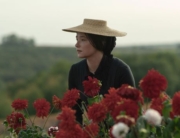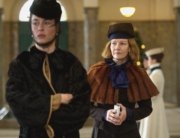The biopic Film Stars Don’t Die in Liverpool could not ask for better performances from its stars. Annette Bening brings worldly sexiness, vulnerability, and tart humor to her role as dying, faded American movie star Gloria Grahame. As her younger British lover and protégé, Jamie Bell projects wide-eyed, loose-limbed energy and loving protectiveness. Based on the 1986 memoir by Peter Turner, the movie’s weepy story lingers in the memory longer after the story ends, thanks to the two leads and their easy chemistry.
At its cheery start, the movie revels in nostalgia for Liverpool in the late 1970s, a workaday stronghold of narrow row houses and wallpaper with patterns that bloom like E. coli under an electron microscope. Aspiring actor Turner (Bell) meets fading movie star Grahame (Bening), who is renting a room in his mother’s house for the duration of a play production. Despite the difference in age, he’s drawn to her brash, carefree disposition and her anecdotes of old Hollywood. The two go on to enjoy impromptu dancing and explore the town, eventually falling into bed. Film Stars creates a compelling dynamic for the pair, which deepens as the plot progresses, following their relationship to New York and Los Angeles, as Grahame is shown expanding Turner’s world.
That being said, all is not hunky-dory. Grahame has an ego and a temper, as befits a movie star. She is extremely sensitive and snaps at any reference to her age. She also has a secret, compelling her to imperiously banish Paul from her New York apartment, sending him back home to Britain. After a long period of estrangement, a transatlantic phone call brings a stunningly sad revelation—Grahame is dying of cancer and wants to live out her remaining days in Paul’s mother’s house in Liverpool. Who could say no?
Although the movie is successful and poignant in many areas, it overemphasizes its protagonist’s incensed denial toward undeniable facts, such as age and death, far too many times. Ultimately, the remainder of the film is dedicated to Grahame’s illness, only heightening the sense of overkill. She does not go gently or quietly into the night; her slow, agonizing demise disrupts the lives of Paul’s parents. It’s debatable whether the care of Grahame should have fallen to the family in the first place, but it’s clear that her presence and dependency wore them out—it’s a relief for the Turners, and for us, when she finally consents to go the hospital. Yet vibrant memories of an unlikely love remain, rescuing the film its their charm.







Leave A Comment